中考英语专题讲练: 状语从句(含解析)
文档属性
| 名称 | 中考英语专题讲练: 状语从句(含解析) | 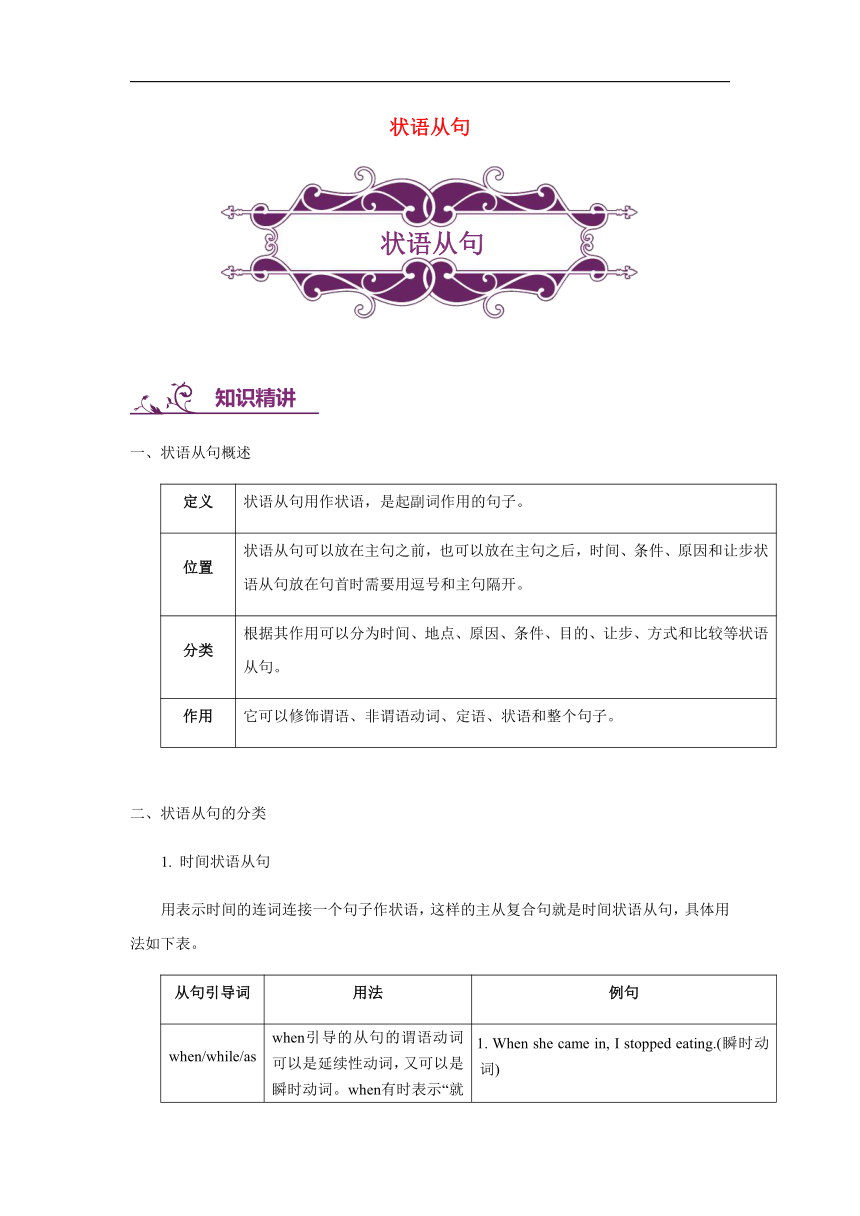 | |
| 格式 | zip | ||
| 文件大小 | 178.5KB | ||
| 资源类型 | 教案 | ||
| 版本资源 | 通用版 | ||
| 科目 | 英语 | ||
| 更新时间 | 2020-09-15 07:03:40 | ||
图片预览

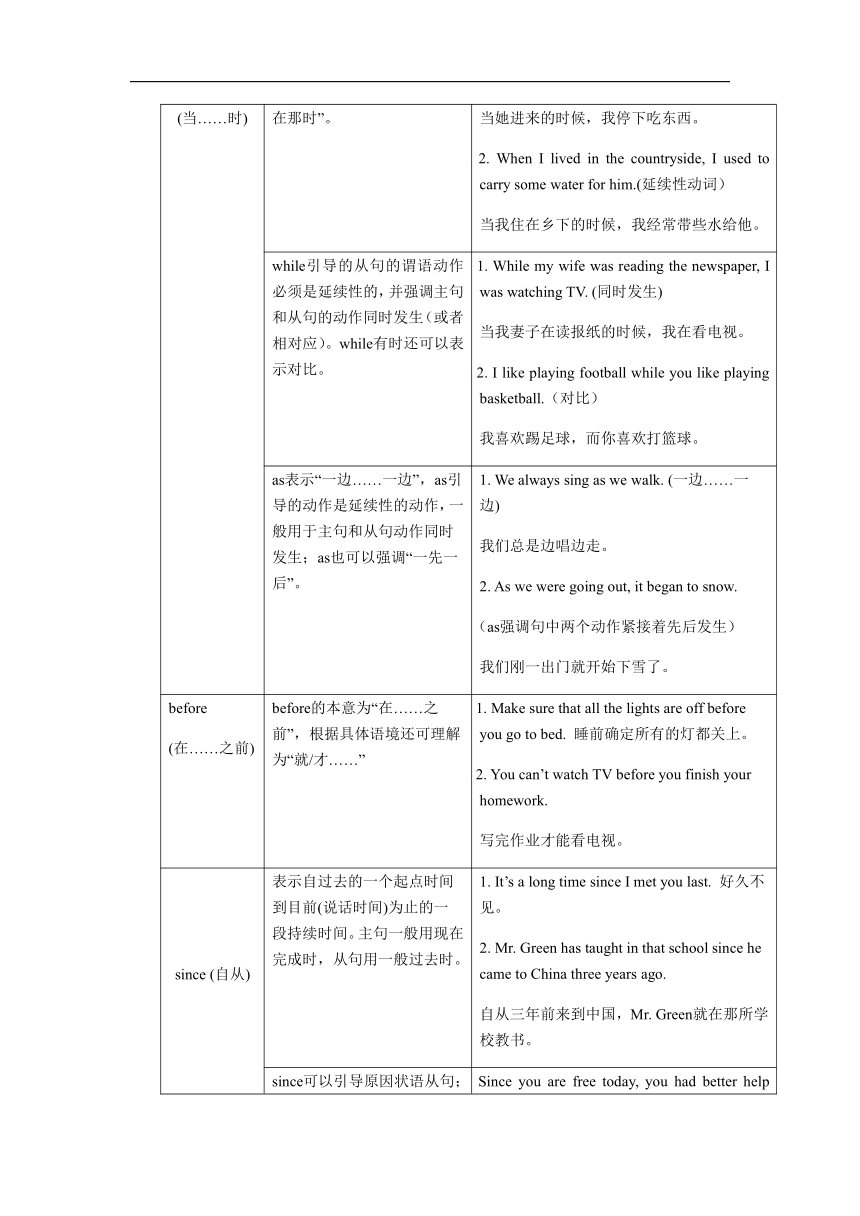
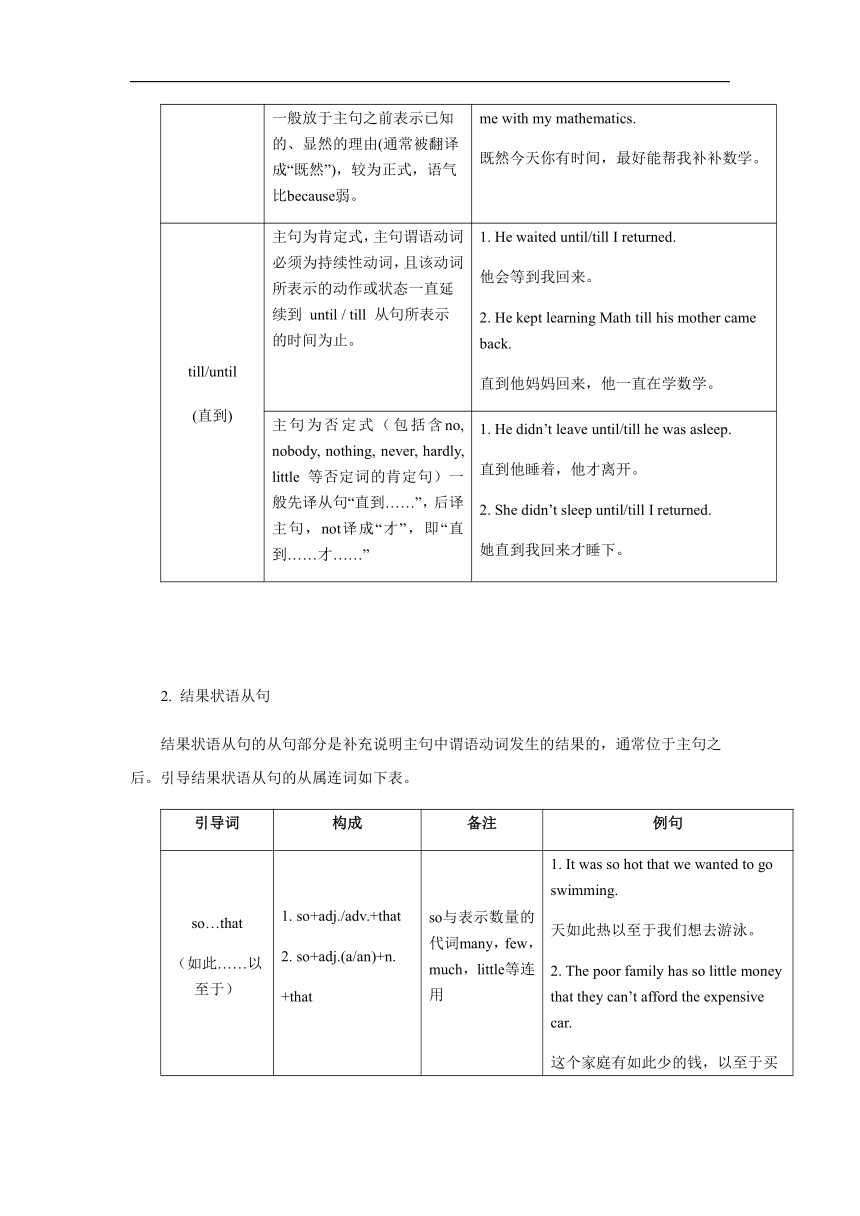
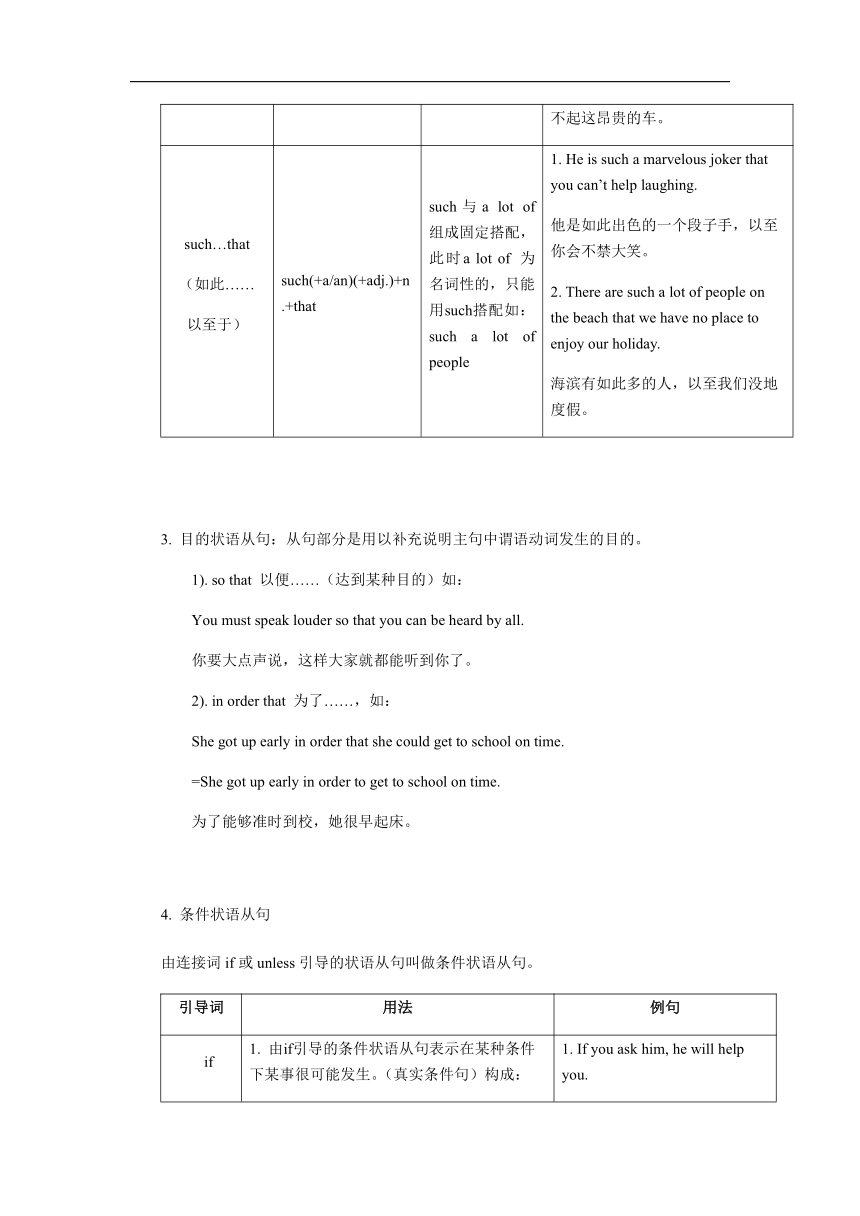
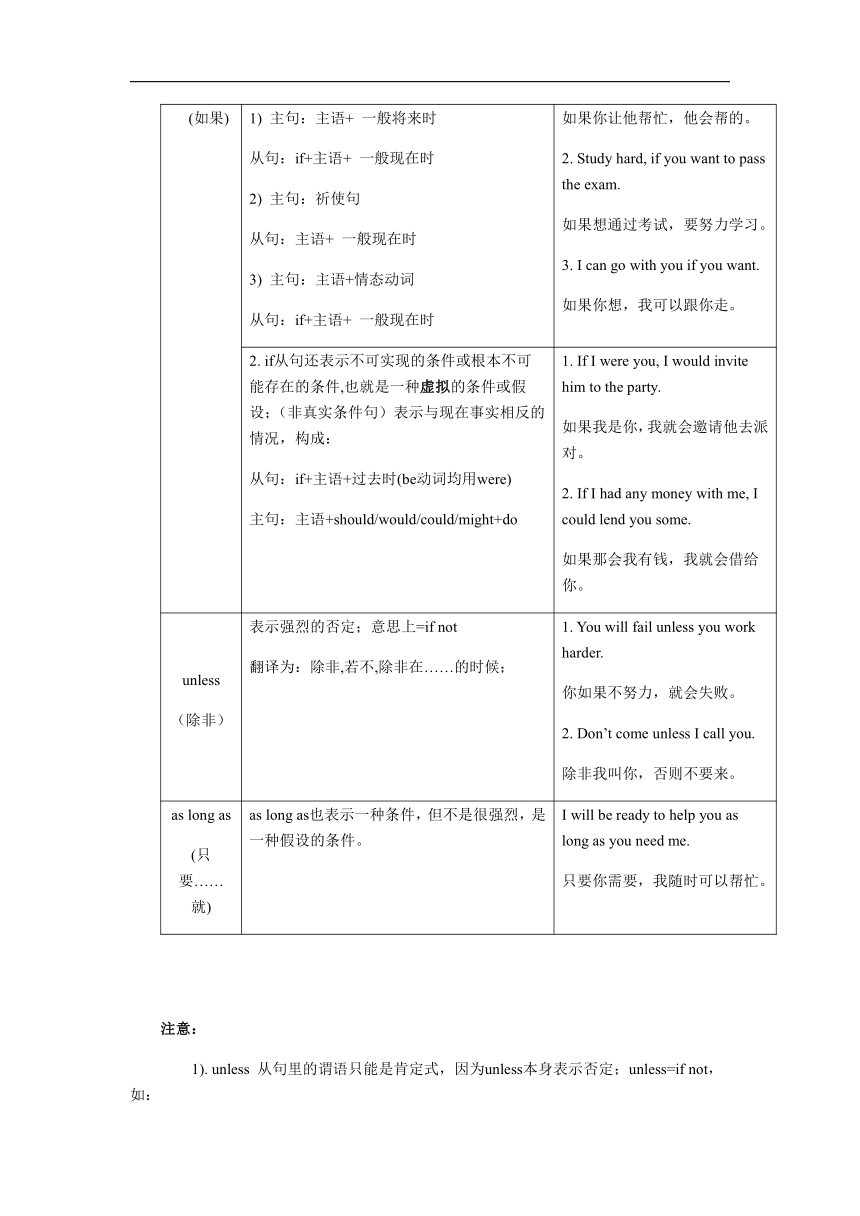
文档简介
状语从句
一、状语从句概述
定义
状语从句用作状语,是起副词作用的句子。
位置
状语从句可以放在主句之前,也可以放在主句之后,时间、条件、原因和让步状语从句放在句首时需要用逗号和主句隔开。
分类
根据其作用可以分为时间、地点、原因、条件、目的、让步、方式和比较等状语从句。
作用
它可以修饰谓语、非谓语动词、定语、状语和整个句子。
二、状语从句的分类
1.
时间状语从句
用表示时间的连词连接一个句子作状语,这样的主从复合句就是时间状语从句,具体用法如下表。
从句引导词
用法
例句
when/while/as(当……时)
when引导的从句的谓语动词可以是延续性动词,又可以是瞬时动词。when有时表示“就在那时”。
1
1.
When
she
came
in,
I
stopped
eating.(瞬时动词)当她进来的时候,我停下吃东西。2
2.
When
I
lived
in
the
countryside,
I
used
to
carry
some
water
for
him.(延续性动词)当我住在乡下的时候,我经常带些水给他。
while引导的从句的谓语动作必须是延续性的,并强调主句和从句的动作同时发生(或者相对应)。while有时还可以表示对比。
1
1.
While
my
wife
was
reading
the
newspaper,
I
was
watching
TV.
(同时发生)当我妻子在读报纸的时候,我在看电视。2
2.
I
like
playing
football
while
you
like
playing
basketball.(对比)我喜欢踢足球,而你喜欢打篮球。
as表示“一边……一边”,as引导的动作是延续性的动作,一般用于主句和从句动作同时发生;as也可以强调“一先一后”。
1.
We
always
sing
as
we
walk.
(一边……一边)我们总是边唱边走。2.
As
we
were
going
out,
it
began
to
snow.(as强调句中两个动作紧接着先后发生)我们刚一出门就开始下雪了。
before
(在……之前)
before的本意为“在……之前”,根据具体语境还可理解为“就/才……”
1
1.
Make
sure
that
all
the
lights
are
off
before
you
go
to
bed.
睡前确定所有的灯都关上。2
2.
You
can’t
watch
TV
before
you
finish
your
homework.写完作业才能看电视。
since
(自从)
表示自过去的一个起点时间到目前(说话时间)为止的一段持续时间。主句一般用现在完成时,从句用一般过去时。
1.
It’s
a
long
time
since
I
met
you
last.
好久不见。2.
Mr.
Green
has
taught
in
that
school
since
he
came
to
China
three
years
ago.自从三年前来到中国,Mr.
Green就在那所学校教书。
since可以引导原因状语从句;一般放于主句之前表示已知的、显然的理由(通常被翻译成“既然”),较为正式,语气比because弱。
1
Since
you
are
free
today,
you
had
better
help
me
with
my
mathematics.既然今天你有时间,最好能帮我补补数学。
till/until(直到)
主句为肯定式,主句谓语动词必须为持续性动词,且该动词所表示的动作或状态一直延续到
until
/
till
从句所表示的时间为止。
1.
He
waited
until/till
I
returned.他会等到我回来。2.
He
kept
learning
Math
till
his
mother
came
back.直到他妈妈回来,他一直在学数学。
主句为否定式(包括含no,
nobody,
nothing,
never,
hardly,
little
等否定词的肯定句)一般先译从句“直到……”,后译主句,not译成“才”,即“直到……才……”
1.
He
didn’t
leave
until/till
he
was
asleep.直到他睡着,他才离开。2.
She
didn’t
sleep
until/till
I
returned.她直到我回来才睡下。
2.
结果状语从句
结果状语从句的从句部分是补充说明主句中谓语动词发生的结果的,通常位于主句之后。引导结果状语从句的从属连词如下表。
引导词
构成
备注
例句
so…that(如此……以至于)
1.
so+adj./adv.+that
2.
so+adj.(a/an)+n.+that
so与表示数量的代词many,few,much,little等连用
1.
It
was
so
hot
that
we
wanted
to
go
swimming.天如此热以至于我们想去游泳。2.
The
poor
family
has
so
little
money
that
they
can’t
afford
the
expensive
car.这个家庭有如此少的钱,以至于买不起这昂贵的车。
such…that(如此……以至于)
such(+a/an)(+adj.)+n.+that
such与a
lot
of
组成固定搭配,此时a
lot
of
为名词性的,只能用such搭配如:such
a
lot
of
people
1.
He
is
such
a
marvelous
joker
that
you
can’t
help
laughing.他是如此出色的一个段子手,以至你会不禁大笑。2.
There
are
such
a
lot
of
people
on
the
beach
that
we
have
no
place
to
enjoy
our
holiday.海滨有如此多的人,以至我们没地度假。
3.
目的状语从句:从句部分是用以补充说明主句中谓语动词发生的目的。
1).
so
that
以便……(达到某种目的)如:
You
must
speak
louder
so
that
you
can
be
heard
by
all.
你要大点声说,这样大家就都能听到你了。
2).
in
order
that
为了……,如:
She
got
up
early
in
order
that
she
could
get
to
school
on
time.
=She
got
up
early
in
order
to
get
to
school
on
time.
为了能够准时到校,她很早起床。
4.
条件状语从句
由连接词if或unless引导的状语从句叫做条件状语从句。
引导词
用法
例句
if(如果)
1.
由if引导的条件状语从句表示在某种条件下某事很可能发生。(真实条件句)构成:1)
主句:主语+
一般将来时从句:if+主语+
一般现在时2)
主句:祈使句从句:主语+
一般现在时3)
主句:主语+情态动词从句:if+主语+
一般现在时
1.
If
you
ask
him,
he
will
help
you.如果你让他帮忙,他会帮的。2.
Study
hard,
if
you
want
to
pass
the
exam.如果想通过考试,要努力学习。3.
I
can
go
with
you
if
you
want.如果你想,我可以跟你走。
2.
if从句还表示不可实现的条件或根本不可能存在的条件,也就是一种虚拟的条件或假设;(非真实条件句)表示与现在事实相反的情况,构成:从句:if+主语+过去时(be动词均用were)主句:主语+should/would/could/might+do
1.
If
I
were
you,
I
would
invite
him
to
the
party.如果我是你,我就会邀请他去派对。2.
If
I
had
any
money
with
me,
I
could
lend
you
some.如果那会我有钱,我就会借给你。
unless(除非)
表示强烈的否定;意思上=if
not翻译为:除非,若不,除非在……的时候;
1.
You
will
fail
unless
you
work
harder.你如果不努力,就会失败。2.
Don’t
come
unless
I
call
you.除非我叫你,否则不要来。
as
long
as(只要……就)
as
long
as也表示一种条件,但不是很强烈,是一种假设的条件。
I
will
be
ready
to
help
you
as
long
as
you
need
me.只要你需要,我随时可以帮忙。
注意:
1).
unless
从句里的谓语只能是肯定式,因为unless本身表示否定;unless=if
not,如:
Let's
go
out
for
a
walk
unless
you
are
too
tired.
=If
you
are
not
too
tired,
let's
go
out
for
a
walk.
如果你不是很累,我们出去散个步吧。
2).
在真实条件句中,主句不能用be
going
to表示将来,该用shall,
will.如:
If
you
will(愿意)
wait
a
minute,
I’ll
go
and
tell
my
mother
that
you
are
here.
如果你愿意等一分钟,我将去告诉我妈妈你在这里。
3).
下列从句中的will不是将来时助动词,而是情态动词。翻译为“愿意”,如:
If
you
will
read
the
book,
I
will
lend
it
to
you.
如果你愿意读书,我就会借给你。
Will
you
marry
me?
你愿意嫁给我吗?
5.
让步状语从句
1).
让步状语从句一般翻译为“尽管……”或“即使……”,就是我们日常生活中用的“退一步说……”的感觉。
2).
引导让步状语从句的连词有:although,
though,
as,
if,
even
if,
even
though,
while,
whether
(...)
or
not,
whatever,
no
matter
what/how/why,如:
Though
they
are
twin
brothers,
they
don’t
look
like
each
other.
尽管他们是双胞胎,但看起来一点都不像。
6.
地点状语从句
引导词
用法
示例
where(在……地方)
“where引导的地点状语从句,(there+)主句”
“哪里……哪里就……”。主句在从句后面时,there可用可不用;主句在从句的前面时,一般都不用there.
Where
there
is
a
will,
there
is
a
way.有志者事竟成。You
should
have
put
the
book
where
you
found
it.你应该把书放回原处。
wherever(无论在哪)
anywhere/wherever引导地点状语从句+主句。anywhere本身是个副词,但是常可以引导从句,相当于连词,意思相当于wherever,
anywhere引导的从句可位于主句之前,也可以位于主句之后。而wherever本身就是个连词,表示“在何处,无论何处”。
Wherever
the
sea
is,
you
will
find
seaman.无论海在何处,你都能找到海员。I’ll
go
anywhere
you
go.我会跟你去任何地方。
7.
原因状语从句
引导词
用法
示例
as(既然)
引导原因状语从句时表示附带。说明“双方已知的原因”,语气比since弱,较为正式,位置较为灵活(常放于主句之前)。
As
the
weather
is
cold,
I
stay
at
home.既然天很冷,我还是待在家里吧。As
it
is
raining,
you’d
better
take
a
taxi.既然碗面下着雨,你最好打个车。
since(因为)
引导的原因状语从句一般放于主句之前表示已知的、显然的理由(通常被翻译成“既然”),较为正式,语气比because弱。
Since
everybody
is
here,
let's
begin
our
meeting.既然人都到齐了,我们就开始开会吧。
because(因为)
引导的原因状语从句一般放于主句之后,表述直接原因,语气较强,最适合why引导的疑问句。Because引导的原因状语从句有时可以与because
of短语互换。
The
woman
prefers
winter
because
she
can
skate.这个女人更喜欢冬天,因为那时她可以滑冰。
for(因为)
引导的原因状语从句并不说明主句行为发生的直接原因,只提供一些辅助性的补充说明,for引导的原因状语从句只能放于主句之后,并且必须用逗号将其与主句隔开。
He
must
be
ill,
for
he
is
absent
today.他一定是生病了,因为今天他没来。
一、重难点:
状语从句在三大从句中较为简单,不涉及语序变换,先行词判断等复杂过程,我们只需要根据实际语境进行判断句子中缺什么东西,对应性地选出相应的关系词。然而有些关系词的意思比较多变,区分这些词在不同语境中的意思是这一部分的唯一难点。
二、易错点:
1.
状语从句的区分和转换
so…that…与…enough
to…的转换
当主句和从句的主语一致,且that从句是肯定句时,可用“enough
to
do
sth.”来转换
The
man
is
so
strong
that
he
can
lift
the
heavy
box.→
The
man
is
strong
enough
to
lift
the
heavy
box.
当主句和从句的主语不一致,且that从句是肯定句时,可以用“enough
for
sb.
to
do
sth.”来替换,但注意不定式的宾语要省略。
The
question
is
so
easy
that
I
can
work
it
out.→
The
question
is
easy
enough
for
me
to
work
out.
so...that...与too...to...的转换
当主句和从句的主语一致,且that从句是否定句时,可以用“too...to...”来替换。
The
girl
is
so
young
that
she
can't
dress
herself.
→
The
girl
is
too
young
to
dress
herself.
当主句和从句的主语不一致,且that从句是否定时,如果要用“too...to...替换“so...that...”,则用介词for引出动词不定式的逻辑主语,可以用“too...for
sb.
to
do
sth.”来替换,注意不定式的宾语要省略。
The
bag
is
so
heavy
that
she
can't
move
it.
→
The
bag
is
too
heavy
for
her
to
move.
It
is
so
hot
that
we
can't
sleep.
→
It
is
too
hot
for
us
to
sleep.
so...that...与such…that的转换
so…that与such…that之间的转换既为so与such之间的转换。
It’s
such
an
interesting
film
that
we
all
want
to
see
it.
→
It’s
so
interesting
a
film
that
we
all
want
to
see
it.
从用法上看,so后应接形容词或副词,而such后接名词(参见以上例句)。但有时“so+形容词”后还可接一个名词,且这个名词总是带不定冠词的单数可数名词(不能是复数名词或不可数名词)。试比较:
正:He
is
so
clever
a
child
that
we
all
like
him.
这小孩很聪明,我们都喜欢他。
正:They
are
such
clever
children
that
we
all
like
them.
误:They
are
so
clever
children
that
we
all
like
them.
2.
if在宾语从句和状语从句中不同的含义。
在宾语从句中我们说过if在宾语和状语从句中意义不同,宾语从句中意为“是否”,而条件状语从句中作“如果”理解,如:
I
don’t
know
if
they
will
come
tomorrow.
我不知道明天他们会不会来。
If
we
I
get
any
information
about
him,
I
will
tell
you.
如果我得到他的任何信息,我都会告诉你。
题模一:时间,结果,目的状语从句
例1.1.1
John
fell
asleep
_________
he
was
listening
to
the
music.
A.
after
B.
before
C.
while
D.
as
soon
as
例1.1.2
Can
you
play
game
with
us
when
your
homework
_________?
A.
is
finished
B.
will
finish
C.
finish
D.
will
be
finished
例1.1.3
Lin
Shuhao
is
_________
famous
_________
all
the
basketball
fans
in
China
know
him.
A.
too;
to
B.
enough
to
C.
so;
that
D.
as;
as
例1.1.4
Mr.
Green
speaks
very
loudly
_________
all
the
students
can
hear
him
clearly.
A.
when
B.
so
that
C.
because
D.
in
order
to
题模二:条件,原因,让步状语从句
例1.2.1
You
will
fall
behind
others
_________
you
work
hard.
A.
if
B.
unless
C.
though
D.
since
例1.2.2
We
should
give
the
boy
another
chance
_________
he
has
made
some
mistakes.
A.
though
B.
when
C.
unless
D.
because
例1.2.3
根据中文提示完成句子,每空一词。
李明昨天没来上学,因为他病了。
Li
Ming
didn’t
come
to
school
_________
_________
_________
_________.
随练1.1
Tom
was
sleeping
_________
his
brother
was
reading
a
magazine.
A.
until
B.
while
C.
before
D.
after
随练1.2
_________
he’s
old,
he
can
still
carry
this
heavy
bag.
A.
Though
B.
Since
C.
For
D.
So
随练1.3
I
was
late
for
class
yesterday
_________
there
was
something
wrong
with
my
bike.
A.
when
B.
that
C.
until
D.
because
随练1.4
We
will
stay
at
home
if
my
aunt
_________
to
visit
us
tomorrow.
A.
comes
B.
come
C.
will
come
D.
is
coming
随练1.5
根据中文提示完成句子
1.
无论他跟我开什么玩笑,我都不生气。
I
am
not
angry
with
him,
_________
_________
_________
jokes
he
_________
on
me.
2.
布鲁斯太太对学生非常亲切,以至于学生把她当做母亲。
Mrs.
Bruce
was
_________
kind
to
her
students
_________
they
_________
her
_________
their
mother.
3.
只要我们竭尽全力,父母就会满意我们的表现。
Our
parents
will
be
pleased
with
our
performance
_________
_________
_________
we
try
our
best.
4.
你一到上海就给我打个电话好吗?
Will
you
please
call
me
_________
_________
_________
you
get
to
Shanghai?
5.
这个七岁的女孩如此酷爱钢琴,以至于他已经坚持练习两年了。
The
seven-year-old
girl
likes
playing
the
piano
_________
_________
_________
she
has
kept
practicing
for
two
years.
随练1.6
---Do
you
know
if
he
_________
to
play
basketball
with
us?
---I
think
he
will
come
if
he
_________
free
tomorrow.
A.
comes;
is
B.
comes;
will
be
C.
will
come;
is
D.
will
come;
will
be
作业1
You
should
finish
your
lessons
_________
you
go
out
to
play.
A.
before
B.
after
C.
when
D.
while
作业2
I
hurried
_________
I
wouldn’t
be
late
for
class.
A.
since
B.
so
that
C.
as
if
D.
unless
作业3
When
you
read
the
book,
you’d
better
make
a
mark
_________
you
have
any
questions.
A.
which
B.
that
C.
where
D.
though
作业4
根据中文提示完成句子
1.
他长大后想当一名记者。
He
wants
to
be
a
journalist
_________
_________
_________
_________.
2.
既然他的腿受伤了,他今天就不能来上学了
_________
_________
_________
his
leg,
he
can’t
get
to
school
today.
3.
如果人人为保护环境做出贡献,世界将会变得更美好。
_________
_________
_________
_________
_________
to
protecting
the
environment,
the
world
will
become
much
more
beautiful.
4.
虽然她很忙,他还坚持自学英语。
_________
_________
_________
_________,
she
kept
on
learning
English
by
herself.
5.
无论你逃到天涯海角,我都会找到你!
_________
_________
_________
you
go,
I
will
find
you
at
last!
作业5
_________
well
you
can
drive,
you
must
drive
carefully.
A.
So
long
as
B.
In
order
that
C.
No
matter
how
D.
The
moment
答案解析
题模一:时间,结果,目的状语从句
例1.1.1
【答案】C
【解析】
考查时间状语从句。从句过去进行时表正在进行,一般用while引导,故选C。
例1.1.2
【答案】A
【解析】
考查状语从句时态和被动语态。首先从句主语为homework,所以应该用被动语态,排除BC;又根据语境,为对将来的一种询问,而从句可用一般现在时表将来,故选A。
例1.1.3
【答案】C
【解析】
考查结果状语从句。根据句意:林书豪如此有名,以至于所有中国篮球粉丝都知道他。如此以至于,后又为形容词,所以用so…that…句型,故选C。
例1.1.4
【答案】B
【解析】
考查目的状语从句。根据句意:格林先生说话声音很大,以便所有学生都能清楚地听到他。so
that表示大声说话的目的,符合题意,故选B。
题模二:条件,原因,让步状语从句
例1.2.1
【答案】B
【解析】
考查条件状语从句。根据句意:如果你不努力,就会落后。unless=if
not如果不,符合题意,故选B。
例1.2.2
【答案】A
【解析】
考查让步状语从句。根据句意:尽管他犯了些错误,我们应该再给这个男孩一次机会。表尽管,故选A。
例1.2.3
【答案】
because
he
was
ill
【解析】
考查原因状语从句。生病是李明没来上学的原因,所以用because引导的原因状语从句。
随练1.1
【答案】B
【解析】
考查时间状语从句。根据句意:当他哥哥读杂志的时候,汤姆在睡觉。表示两个动作同时进行,而且有一种对比的意味,故选B。
随练1.2
【答案】A
【解析】
考查让步状语从句。根据句意:尽管他很老,他仍能搬动这个很重的箱子。前后两句有种让步转折的关系,故选A。
随练1.3
【答案】D
【解析】
考查原因状语从句。根据句意:昨天我迟到了,因为我的自行车坏了。自行车坏了是迟到的原因,故选D。
随练1.4
【答案】A
【解析】
考查条件状语从句时态。if引导的条件状语从句在表述将来的事情时,遵循“主将从现”原则,即主句用将来时,从句用一般现在时表将来,故选A。
随练1.5
【答案】
1.
no
matter
what;
plays
2.
so;
that;
regarded;
as
3.
as
long
as
4.
as
soon
as
5.
so
much
that
【解析】
1.
考查让步状语从句。no
matter
what无论什么;play
jokes开玩笑。
2.
考查结果状语从句。so…that如此以至于;regard
sb.
as把某人当做……。
3.
考查条件状语从句。as
long
as只要……就。
4.
考查时间状语从句。as
soon
as一……就,同时注意“主将从现”。
5.
考查结果状语从句。so…that如此……以至于。
随练1.6
【答案】C
【解析】
考查宾语从句和条件状语从句的时态。本题两个if引导的从句,但第一句为宾语从句,意思为“是否”;第二句是条件状语从句,意思为“如果”。宾语从句主句一般现在时,从句时态根据实际情况而定,根据回答可知打篮球的事情还未发生,故用将来时,排除AB;又第二句为if引导的时间状语从句,对未来描述遵循“主将从现”,故选C。
作业1
【答案】A
【解析】
考查时间状语从句。根据语境,出去玩之前应该完成功课,故选A。
作业2
【答案】B
【解析】
考查目的状语从句。根据句意:我健步如飞,以保证自己不迟到。不迟到是自己很快地走的目的;A.自从;B.以至;C.好像;D除非,故选B。
作业3
【答案】C
【解析】
考查地点状语从句。根据句意:当你读书的时候,你最好在有问题的地方作标记。后面缺在哪,即地点状语,故选C。
作业4
【答案】
1.
when
he
grows
up
2.
Since
he
broke
3.
If
everyone
makes
a
contribution
to
4.
Though
she
was
busy
5.
No
matter
where
【解析】
1.
考查时间状语从句。当……时候用when引导的时间状语从句,注意时态的同意和三单动词变化。
2.
考查原因状语从句。腿受伤是不能来上学显而易见的原因,所以用since;腿肯定是以前伤的,用过去时。
3.
考查条件状语从句。“如果”明显用if引导的条件句,注意“主将从现”的时态,以及make
a
contribution的固定表达。
4.
考查让步状语从句。根据语境,应该用though引导的让步状语从句,再根据主句判断时态为过去时。
5.
考查地点状语从句。无论哪里,地点状语从句,用no
matter
where或wherever引导。
作业5
【答案】C
【解析】
考查让步状语从句。根据句意:无论你开车开得多好,你都必须要非常小心。A.只要……就;B.为了……;C.无论多么……;D.当那一刻,故选C。
状语从句
知识精讲
三点剖析
题模精选
随堂练习
自我总结
课后作业
状语从句
题模精选
随堂练习
PAGE
一、状语从句概述
定义
状语从句用作状语,是起副词作用的句子。
位置
状语从句可以放在主句之前,也可以放在主句之后,时间、条件、原因和让步状语从句放在句首时需要用逗号和主句隔开。
分类
根据其作用可以分为时间、地点、原因、条件、目的、让步、方式和比较等状语从句。
作用
它可以修饰谓语、非谓语动词、定语、状语和整个句子。
二、状语从句的分类
1.
时间状语从句
用表示时间的连词连接一个句子作状语,这样的主从复合句就是时间状语从句,具体用法如下表。
从句引导词
用法
例句
when/while/as(当……时)
when引导的从句的谓语动词可以是延续性动词,又可以是瞬时动词。when有时表示“就在那时”。
1
1.
When
she
came
in,
I
stopped
eating.(瞬时动词)当她进来的时候,我停下吃东西。2
2.
When
I
lived
in
the
countryside,
I
used
to
carry
some
water
for
him.(延续性动词)当我住在乡下的时候,我经常带些水给他。
while引导的从句的谓语动作必须是延续性的,并强调主句和从句的动作同时发生(或者相对应)。while有时还可以表示对比。
1
1.
While
my
wife
was
reading
the
newspaper,
I
was
watching
TV.
(同时发生)当我妻子在读报纸的时候,我在看电视。2
2.
I
like
playing
football
while
you
like
playing
basketball.(对比)我喜欢踢足球,而你喜欢打篮球。
as表示“一边……一边”,as引导的动作是延续性的动作,一般用于主句和从句动作同时发生;as也可以强调“一先一后”。
1.
We
always
sing
as
we
walk.
(一边……一边)我们总是边唱边走。2.
As
we
were
going
out,
it
began
to
snow.(as强调句中两个动作紧接着先后发生)我们刚一出门就开始下雪了。
before
(在……之前)
before的本意为“在……之前”,根据具体语境还可理解为“就/才……”
1
1.
Make
sure
that
all
the
lights
are
off
before
you
go
to
bed.
睡前确定所有的灯都关上。2
2.
You
can’t
watch
TV
before
you
finish
your
homework.写完作业才能看电视。
since
(自从)
表示自过去的一个起点时间到目前(说话时间)为止的一段持续时间。主句一般用现在完成时,从句用一般过去时。
1.
It’s
a
long
time
since
I
met
you
last.
好久不见。2.
Mr.
Green
has
taught
in
that
school
since
he
came
to
China
three
years
ago.自从三年前来到中国,Mr.
Green就在那所学校教书。
since可以引导原因状语从句;一般放于主句之前表示已知的、显然的理由(通常被翻译成“既然”),较为正式,语气比because弱。
1
Since
you
are
free
today,
you
had
better
help
me
with
my
mathematics.既然今天你有时间,最好能帮我补补数学。
till/until(直到)
主句为肯定式,主句谓语动词必须为持续性动词,且该动词所表示的动作或状态一直延续到
until
/
till
从句所表示的时间为止。
1.
He
waited
until/till
I
returned.他会等到我回来。2.
He
kept
learning
Math
till
his
mother
came
back.直到他妈妈回来,他一直在学数学。
主句为否定式(包括含no,
nobody,
nothing,
never,
hardly,
little
等否定词的肯定句)一般先译从句“直到……”,后译主句,not译成“才”,即“直到……才……”
1.
He
didn’t
leave
until/till
he
was
asleep.直到他睡着,他才离开。2.
She
didn’t
sleep
until/till
I
returned.她直到我回来才睡下。
2.
结果状语从句
结果状语从句的从句部分是补充说明主句中谓语动词发生的结果的,通常位于主句之后。引导结果状语从句的从属连词如下表。
引导词
构成
备注
例句
so…that(如此……以至于)
1.
so+adj./adv.+that
2.
so+adj.(a/an)+n.+that
so与表示数量的代词many,few,much,little等连用
1.
It
was
so
hot
that
we
wanted
to
go
swimming.天如此热以至于我们想去游泳。2.
The
poor
family
has
so
little
money
that
they
can’t
afford
the
expensive
car.这个家庭有如此少的钱,以至于买不起这昂贵的车。
such…that(如此……以至于)
such(+a/an)(+adj.)+n.+that
such与a
lot
of
组成固定搭配,此时a
lot
of
为名词性的,只能用such搭配如:such
a
lot
of
people
1.
He
is
such
a
marvelous
joker
that
you
can’t
help
laughing.他是如此出色的一个段子手,以至你会不禁大笑。2.
There
are
such
a
lot
of
people
on
the
beach
that
we
have
no
place
to
enjoy
our
holiday.海滨有如此多的人,以至我们没地度假。
3.
目的状语从句:从句部分是用以补充说明主句中谓语动词发生的目的。
1).
so
that
以便……(达到某种目的)如:
You
must
speak
louder
so
that
you
can
be
heard
by
all.
你要大点声说,这样大家就都能听到你了。
2).
in
order
that
为了……,如:
She
got
up
early
in
order
that
she
could
get
to
school
on
time.
=She
got
up
early
in
order
to
get
to
school
on
time.
为了能够准时到校,她很早起床。
4.
条件状语从句
由连接词if或unless引导的状语从句叫做条件状语从句。
引导词
用法
例句
if(如果)
1.
由if引导的条件状语从句表示在某种条件下某事很可能发生。(真实条件句)构成:1)
主句:主语+
一般将来时从句:if+主语+
一般现在时2)
主句:祈使句从句:主语+
一般现在时3)
主句:主语+情态动词从句:if+主语+
一般现在时
1.
If
you
ask
him,
he
will
help
you.如果你让他帮忙,他会帮的。2.
Study
hard,
if
you
want
to
pass
the
exam.如果想通过考试,要努力学习。3.
I
can
go
with
you
if
you
want.如果你想,我可以跟你走。
2.
if从句还表示不可实现的条件或根本不可能存在的条件,也就是一种虚拟的条件或假设;(非真实条件句)表示与现在事实相反的情况,构成:从句:if+主语+过去时(be动词均用were)主句:主语+should/would/could/might+do
1.
If
I
were
you,
I
would
invite
him
to
the
party.如果我是你,我就会邀请他去派对。2.
If
I
had
any
money
with
me,
I
could
lend
you
some.如果那会我有钱,我就会借给你。
unless(除非)
表示强烈的否定;意思上=if
not翻译为:除非,若不,除非在……的时候;
1.
You
will
fail
unless
you
work
harder.你如果不努力,就会失败。2.
Don’t
come
unless
I
call
you.除非我叫你,否则不要来。
as
long
as(只要……就)
as
long
as也表示一种条件,但不是很强烈,是一种假设的条件。
I
will
be
ready
to
help
you
as
long
as
you
need
me.只要你需要,我随时可以帮忙。
注意:
1).
unless
从句里的谓语只能是肯定式,因为unless本身表示否定;unless=if
not,如:
Let's
go
out
for
a
walk
unless
you
are
too
tired.
=If
you
are
not
too
tired,
let's
go
out
for
a
walk.
如果你不是很累,我们出去散个步吧。
2).
在真实条件句中,主句不能用be
going
to表示将来,该用shall,
will.如:
If
you
will(愿意)
wait
a
minute,
I’ll
go
and
tell
my
mother
that
you
are
here.
如果你愿意等一分钟,我将去告诉我妈妈你在这里。
3).
下列从句中的will不是将来时助动词,而是情态动词。翻译为“愿意”,如:
If
you
will
read
the
book,
I
will
lend
it
to
you.
如果你愿意读书,我就会借给你。
Will
you
marry
me?
你愿意嫁给我吗?
5.
让步状语从句
1).
让步状语从句一般翻译为“尽管……”或“即使……”,就是我们日常生活中用的“退一步说……”的感觉。
2).
引导让步状语从句的连词有:although,
though,
as,
if,
even
if,
even
though,
while,
whether
(...)
or
not,
whatever,
no
matter
what/how/why,如:
Though
they
are
twin
brothers,
they
don’t
look
like
each
other.
尽管他们是双胞胎,但看起来一点都不像。
6.
地点状语从句
引导词
用法
示例
where(在……地方)
“where引导的地点状语从句,(there+)主句”
“哪里……哪里就……”。主句在从句后面时,there可用可不用;主句在从句的前面时,一般都不用there.
Where
there
is
a
will,
there
is
a
way.有志者事竟成。You
should
have
put
the
book
where
you
found
it.你应该把书放回原处。
wherever(无论在哪)
anywhere/wherever引导地点状语从句+主句。anywhere本身是个副词,但是常可以引导从句,相当于连词,意思相当于wherever,
anywhere引导的从句可位于主句之前,也可以位于主句之后。而wherever本身就是个连词,表示“在何处,无论何处”。
Wherever
the
sea
is,
you
will
find
seaman.无论海在何处,你都能找到海员。I’ll
go
anywhere
you
go.我会跟你去任何地方。
7.
原因状语从句
引导词
用法
示例
as(既然)
引导原因状语从句时表示附带。说明“双方已知的原因”,语气比since弱,较为正式,位置较为灵活(常放于主句之前)。
As
the
weather
is
cold,
I
stay
at
home.既然天很冷,我还是待在家里吧。As
it
is
raining,
you’d
better
take
a
taxi.既然碗面下着雨,你最好打个车。
since(因为)
引导的原因状语从句一般放于主句之前表示已知的、显然的理由(通常被翻译成“既然”),较为正式,语气比because弱。
Since
everybody
is
here,
let's
begin
our
meeting.既然人都到齐了,我们就开始开会吧。
because(因为)
引导的原因状语从句一般放于主句之后,表述直接原因,语气较强,最适合why引导的疑问句。Because引导的原因状语从句有时可以与because
of短语互换。
The
woman
prefers
winter
because
she
can
skate.这个女人更喜欢冬天,因为那时她可以滑冰。
for(因为)
引导的原因状语从句并不说明主句行为发生的直接原因,只提供一些辅助性的补充说明,for引导的原因状语从句只能放于主句之后,并且必须用逗号将其与主句隔开。
He
must
be
ill,
for
he
is
absent
today.他一定是生病了,因为今天他没来。
一、重难点:
状语从句在三大从句中较为简单,不涉及语序变换,先行词判断等复杂过程,我们只需要根据实际语境进行判断句子中缺什么东西,对应性地选出相应的关系词。然而有些关系词的意思比较多变,区分这些词在不同语境中的意思是这一部分的唯一难点。
二、易错点:
1.
状语从句的区分和转换
so…that…与…enough
to…的转换
当主句和从句的主语一致,且that从句是肯定句时,可用“enough
to
do
sth.”来转换
The
man
is
so
strong
that
he
can
lift
the
heavy
box.→
The
man
is
strong
enough
to
lift
the
heavy
box.
当主句和从句的主语不一致,且that从句是肯定句时,可以用“enough
for
sb.
to
do
sth.”来替换,但注意不定式的宾语要省略。
The
question
is
so
easy
that
I
can
work
it
out.→
The
question
is
easy
enough
for
me
to
work
out.
so...that...与too...to...的转换
当主句和从句的主语一致,且that从句是否定句时,可以用“too...to...”来替换。
The
girl
is
so
young
that
she
can't
dress
herself.
→
The
girl
is
too
young
to
dress
herself.
当主句和从句的主语不一致,且that从句是否定时,如果要用“too...to...替换“so...that...”,则用介词for引出动词不定式的逻辑主语,可以用“too...for
sb.
to
do
sth.”来替换,注意不定式的宾语要省略。
The
bag
is
so
heavy
that
she
can't
move
it.
→
The
bag
is
too
heavy
for
her
to
move.
It
is
so
hot
that
we
can't
sleep.
→
It
is
too
hot
for
us
to
sleep.
so...that...与such…that的转换
so…that与such…that之间的转换既为so与such之间的转换。
It’s
such
an
interesting
film
that
we
all
want
to
see
it.
→
It’s
so
interesting
a
film
that
we
all
want
to
see
it.
从用法上看,so后应接形容词或副词,而such后接名词(参见以上例句)。但有时“so+形容词”后还可接一个名词,且这个名词总是带不定冠词的单数可数名词(不能是复数名词或不可数名词)。试比较:
正:He
is
so
clever
a
child
that
we
all
like
him.
这小孩很聪明,我们都喜欢他。
正:They
are
such
clever
children
that
we
all
like
them.
误:They
are
so
clever
children
that
we
all
like
them.
2.
if在宾语从句和状语从句中不同的含义。
在宾语从句中我们说过if在宾语和状语从句中意义不同,宾语从句中意为“是否”,而条件状语从句中作“如果”理解,如:
I
don’t
know
if
they
will
come
tomorrow.
我不知道明天他们会不会来。
If
we
I
get
any
information
about
him,
I
will
tell
you.
如果我得到他的任何信息,我都会告诉你。
题模一:时间,结果,目的状语从句
例1.1.1
John
fell
asleep
_________
he
was
listening
to
the
music.
A.
after
B.
before
C.
while
D.
as
soon
as
例1.1.2
Can
you
play
game
with
us
when
your
homework
_________?
A.
is
finished
B.
will
finish
C.
finish
D.
will
be
finished
例1.1.3
Lin
Shuhao
is
_________
famous
_________
all
the
basketball
fans
in
China
know
him.
A.
too;
to
B.
enough
to
C.
so;
that
D.
as;
as
例1.1.4
Mr.
Green
speaks
very
loudly
_________
all
the
students
can
hear
him
clearly.
A.
when
B.
so
that
C.
because
D.
in
order
to
题模二:条件,原因,让步状语从句
例1.2.1
You
will
fall
behind
others
_________
you
work
hard.
A.
if
B.
unless
C.
though
D.
since
例1.2.2
We
should
give
the
boy
another
chance
_________
he
has
made
some
mistakes.
A.
though
B.
when
C.
unless
D.
because
例1.2.3
根据中文提示完成句子,每空一词。
李明昨天没来上学,因为他病了。
Li
Ming
didn’t
come
to
school
_________
_________
_________
_________.
随练1.1
Tom
was
sleeping
_________
his
brother
was
reading
a
magazine.
A.
until
B.
while
C.
before
D.
after
随练1.2
_________
he’s
old,
he
can
still
carry
this
heavy
bag.
A.
Though
B.
Since
C.
For
D.
So
随练1.3
I
was
late
for
class
yesterday
_________
there
was
something
wrong
with
my
bike.
A.
when
B.
that
C.
until
D.
because
随练1.4
We
will
stay
at
home
if
my
aunt
_________
to
visit
us
tomorrow.
A.
comes
B.
come
C.
will
come
D.
is
coming
随练1.5
根据中文提示完成句子
1.
无论他跟我开什么玩笑,我都不生气。
I
am
not
angry
with
him,
_________
_________
_________
jokes
he
_________
on
me.
2.
布鲁斯太太对学生非常亲切,以至于学生把她当做母亲。
Mrs.
Bruce
was
_________
kind
to
her
students
_________
they
_________
her
_________
their
mother.
3.
只要我们竭尽全力,父母就会满意我们的表现。
Our
parents
will
be
pleased
with
our
performance
_________
_________
_________
we
try
our
best.
4.
你一到上海就给我打个电话好吗?
Will
you
please
call
me
_________
_________
_________
you
get
to
Shanghai?
5.
这个七岁的女孩如此酷爱钢琴,以至于他已经坚持练习两年了。
The
seven-year-old
girl
likes
playing
the
piano
_________
_________
_________
she
has
kept
practicing
for
two
years.
随练1.6
---Do
you
know
if
he
_________
to
play
basketball
with
us?
---I
think
he
will
come
if
he
_________
free
tomorrow.
A.
comes;
is
B.
comes;
will
be
C.
will
come;
is
D.
will
come;
will
be
作业1
You
should
finish
your
lessons
_________
you
go
out
to
play.
A.
before
B.
after
C.
when
D.
while
作业2
I
hurried
_________
I
wouldn’t
be
late
for
class.
A.
since
B.
so
that
C.
as
if
D.
unless
作业3
When
you
read
the
book,
you’d
better
make
a
mark
_________
you
have
any
questions.
A.
which
B.
that
C.
where
D.
though
作业4
根据中文提示完成句子
1.
他长大后想当一名记者。
He
wants
to
be
a
journalist
_________
_________
_________
_________.
2.
既然他的腿受伤了,他今天就不能来上学了
_________
_________
_________
his
leg,
he
can’t
get
to
school
today.
3.
如果人人为保护环境做出贡献,世界将会变得更美好。
_________
_________
_________
_________
_________
to
protecting
the
environment,
the
world
will
become
much
more
beautiful.
4.
虽然她很忙,他还坚持自学英语。
_________
_________
_________
_________,
she
kept
on
learning
English
by
herself.
5.
无论你逃到天涯海角,我都会找到你!
_________
_________
_________
you
go,
I
will
find
you
at
last!
作业5
_________
well
you
can
drive,
you
must
drive
carefully.
A.
So
long
as
B.
In
order
that
C.
No
matter
how
D.
The
moment
答案解析
题模一:时间,结果,目的状语从句
例1.1.1
【答案】C
【解析】
考查时间状语从句。从句过去进行时表正在进行,一般用while引导,故选C。
例1.1.2
【答案】A
【解析】
考查状语从句时态和被动语态。首先从句主语为homework,所以应该用被动语态,排除BC;又根据语境,为对将来的一种询问,而从句可用一般现在时表将来,故选A。
例1.1.3
【答案】C
【解析】
考查结果状语从句。根据句意:林书豪如此有名,以至于所有中国篮球粉丝都知道他。如此以至于,后又为形容词,所以用so…that…句型,故选C。
例1.1.4
【答案】B
【解析】
考查目的状语从句。根据句意:格林先生说话声音很大,以便所有学生都能清楚地听到他。so
that表示大声说话的目的,符合题意,故选B。
题模二:条件,原因,让步状语从句
例1.2.1
【答案】B
【解析】
考查条件状语从句。根据句意:如果你不努力,就会落后。unless=if
not如果不,符合题意,故选B。
例1.2.2
【答案】A
【解析】
考查让步状语从句。根据句意:尽管他犯了些错误,我们应该再给这个男孩一次机会。表尽管,故选A。
例1.2.3
【答案】
because
he
was
ill
【解析】
考查原因状语从句。生病是李明没来上学的原因,所以用because引导的原因状语从句。
随练1.1
【答案】B
【解析】
考查时间状语从句。根据句意:当他哥哥读杂志的时候,汤姆在睡觉。表示两个动作同时进行,而且有一种对比的意味,故选B。
随练1.2
【答案】A
【解析】
考查让步状语从句。根据句意:尽管他很老,他仍能搬动这个很重的箱子。前后两句有种让步转折的关系,故选A。
随练1.3
【答案】D
【解析】
考查原因状语从句。根据句意:昨天我迟到了,因为我的自行车坏了。自行车坏了是迟到的原因,故选D。
随练1.4
【答案】A
【解析】
考查条件状语从句时态。if引导的条件状语从句在表述将来的事情时,遵循“主将从现”原则,即主句用将来时,从句用一般现在时表将来,故选A。
随练1.5
【答案】
1.
no
matter
what;
plays
2.
so;
that;
regarded;
as
3.
as
long
as
4.
as
soon
as
5.
so
much
that
【解析】
1.
考查让步状语从句。no
matter
what无论什么;play
jokes开玩笑。
2.
考查结果状语从句。so…that如此以至于;regard
sb.
as把某人当做……。
3.
考查条件状语从句。as
long
as只要……就。
4.
考查时间状语从句。as
soon
as一……就,同时注意“主将从现”。
5.
考查结果状语从句。so…that如此……以至于。
随练1.6
【答案】C
【解析】
考查宾语从句和条件状语从句的时态。本题两个if引导的从句,但第一句为宾语从句,意思为“是否”;第二句是条件状语从句,意思为“如果”。宾语从句主句一般现在时,从句时态根据实际情况而定,根据回答可知打篮球的事情还未发生,故用将来时,排除AB;又第二句为if引导的时间状语从句,对未来描述遵循“主将从现”,故选C。
作业1
【答案】A
【解析】
考查时间状语从句。根据语境,出去玩之前应该完成功课,故选A。
作业2
【答案】B
【解析】
考查目的状语从句。根据句意:我健步如飞,以保证自己不迟到。不迟到是自己很快地走的目的;A.自从;B.以至;C.好像;D除非,故选B。
作业3
【答案】C
【解析】
考查地点状语从句。根据句意:当你读书的时候,你最好在有问题的地方作标记。后面缺在哪,即地点状语,故选C。
作业4
【答案】
1.
when
he
grows
up
2.
Since
he
broke
3.
If
everyone
makes
a
contribution
to
4.
Though
she
was
busy
5.
No
matter
where
【解析】
1.
考查时间状语从句。当……时候用when引导的时间状语从句,注意时态的同意和三单动词变化。
2.
考查原因状语从句。腿受伤是不能来上学显而易见的原因,所以用since;腿肯定是以前伤的,用过去时。
3.
考查条件状语从句。“如果”明显用if引导的条件句,注意“主将从现”的时态,以及make
a
contribution的固定表达。
4.
考查让步状语从句。根据语境,应该用though引导的让步状语从句,再根据主句判断时态为过去时。
5.
考查地点状语从句。无论哪里,地点状语从句,用no
matter
where或wherever引导。
作业5
【答案】C
【解析】
考查让步状语从句。根据句意:无论你开车开得多好,你都必须要非常小心。A.只要……就;B.为了……;C.无论多么……;D.当那一刻,故选C。
状语从句
知识精讲
三点剖析
题模精选
随堂练习
自我总结
课后作业
状语从句
题模精选
随堂练习
PAGE
同课章节目录
- 词法
- 名词
- 动词和动词短语
- 动词语态
- 动词时态
- 助动词和情态动词
- 非谓语动词
- 冠词
- 代词
- 数词和量词
- 形容词副词及其比较等级
- 介词和介词短语
- 连词和感叹词
- 构词法
- 相似、相近词比较
- 句法
- 陈述句
- 一般疑问句和否定疑问句
- 特殊疑问句及选择疑问句
- 反意疑问句
- 存在句(There be句型)
- 宾语从句
- 定语从句
- 状语从句
- 主谓一致问题
- 简单句
- 并列句
- 复合句
- 主谓一致
- 主、表语从句
- 名词性从句
- 直接引语和间接引语
- 虚拟语气
- 感叹句
- 强调句
- 倒装句
- 祈使句
- 句子的成分
- 句子的分类
- 题型专区
- 单项选择部分
- 易错题
- 完形填空
- 阅读理解
- 词汇练习
- 听说训练
- 句型转换
- 补全对话
- 短文改错
- 翻译
- 书面表达
- 任务型阅读
- 语法填空
- 其他资料
